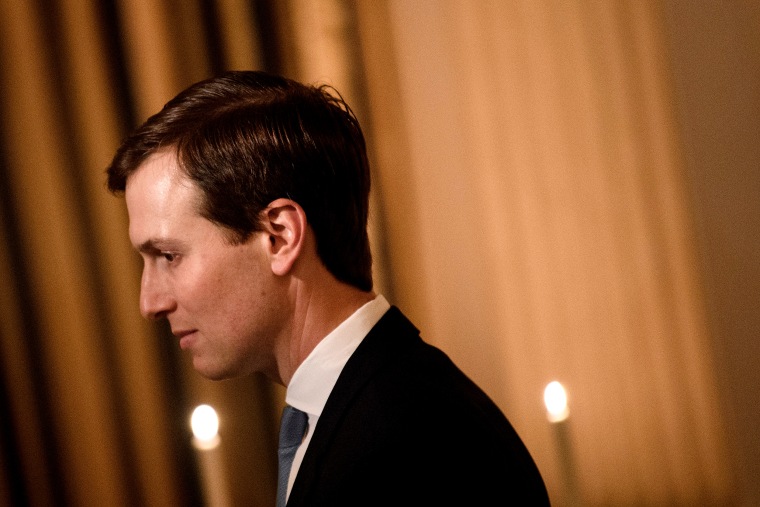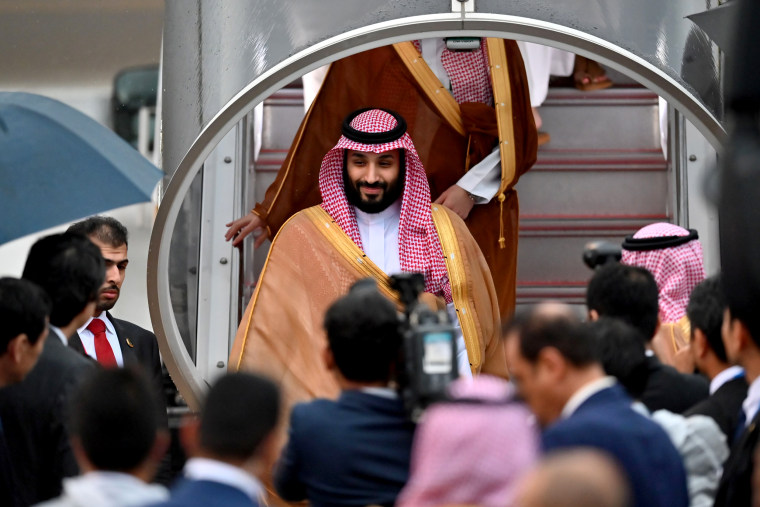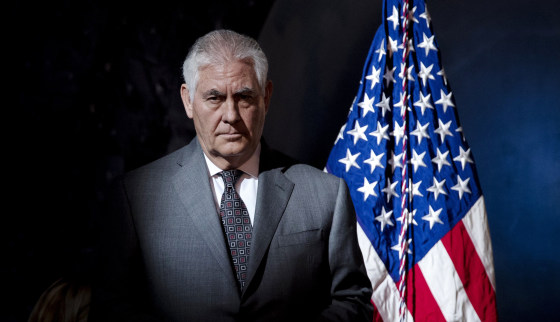WASHINGTON — Jared Kushner, President Donald Trump's son-in-law and adviser, often held talks with Saudi Arabia's crown prince and other foreign government officials without briefing or informing senior U.S. diplomats about his discussions, former Secretary of State Rex Tillerson told lawmakers in testimony released Thursday.
Tillerson recounted his experience in the top diplomatic job at a closed-door hearing with the House Foreign Affairs Committee last month and the transcript was released to NBC News and other media Thursday.
Tillerson, fired last year by Trump, said he was sometimes caught off guard by Kushner's talks with foreign officials. In one case, Tillerson said he was dining at a restaurant in Washington when the owner of the restaurant told him Mexico's foreign minister was seated at another table.
"I walked back. And Mr. Kushner, and I don't remember who else was at the table, and the foreign secretary were at the table having dinner," Tillerson said. "And I could see the color go out of the face of the foreign secretary of Mexico. ... I smiled big, and I said: 'Welcome to Washington.'

"And I said: 'I don't want to interrupt what y'all are doing.' I said: 'Give me a call next time you're coming to town.' And I left it at that."
Tillerson said the Mexican foreign minister "was operating on the assumption that everything he was talking to Mr. Kushner about had been run through the State Department and that I was fully on board with it.
"And he was rather shocked to find out that when he started telling me all these things that were news to me, I told him this is the first time I'm hearing of it."
Tillerson said Kushner often did not brief him on his discussions with Saudi Crown Prince Mohammed bin Salman and other Arab leaders.
A House Foreign Affairs Committee lawyer with the Democratic majority asked Tillerson if he knew of a dinner meeting on May 20, 2017, between Kushner, former presidential adviser Stephen Bannon and the rulers of Saudi Arabia and the United Arab Emirates, in which the Arab leaders discussed imposing a blockade on Qatar. Tillerson said he was not aware of the meeting.
"We understand that as part of that dinner the leaders of Saudi and UAE did lay out for Mr. Kushner and Mr. Bannon their plans for the blockade," the committee lawyer said.
"What's your reaction to a meeting of that sort having taken place without your knowledge?" the lawyer asked Tillerson.
"It makes me angry," Tillerson said. "Because I didn't have a say. The State Department's views were never expressed."
The alleged meeting has not been previously reported and it remained unclear what information the committee staff member's question was based on. Tillerson's testimony occurred behind closed doors but was not a classified hearing.
Tillerson and Defense Secretary James Mattis were on a visit to Australia in June when they first learned of the blockade on Qatar, and it caught both of them by surprise. Their Arab counterparts had not given them any advance warning, even though they had met with them only days earlier at a summit in Riyadh of heads of state, Tillerson said.
Both men then sought to defuse the crisis and appealed to both sides not to aggravate tensions.
Asked if would have expected to be notified by the Arab governments of the blockade, Tillerson said: "I would have hoped they would have. Certainly at the time, I think both Secretary Mattis and I both felt, given the significant footprint of our Defense Department assets and my role, that someone would have called us and told us."
Tillerson said he was blindsided by President Trump's tweet that praised the blockade on Qatar, and that he and Kushner disagreed about the issue.
"And I think he, you know, he was more of a view that he thought the blockading countries had, you know, had good reason to do what they were doing," Tillerson said. "So it's just one of those things where we took a slightly different view of it."
Tillerson also said Kushner once asked him to meet a Saudi official to brief him on discussions that Kushner had held with the Saudi government about bolstering the U.S.-Saudi relationship. Tillerson was given a thick binder of documents about the plan, which he had not been briefed on previously.
Of Kushner's relationship with Saudi Crown Prince Mohammed Bin Salman, Tillerson said, "I was certainly aware that there was a lot of communication between the two of them. I was aware of occasional trips that had been taken by Mr. Kushner to the kingdom to visit the crown prince."
Tillerson said Kushner would sometimes organize his travel abroad without consulting the local embassy.
He said that "on occasion, the president's senior adviser would make trips abroad and usually, you know, kind of was in charge of his own agenda." He added: "And typically not a lot of coordination with the embassy."
The former secretary of state said that he raised concerns about Kushner's tendency to cut the State Department out of the loop with the White House and with Kushner himself.
"He said he would try to do better." Tillerson said.
But "not much changed."

Tillerson said he was blindsided by the decision by Saudi Arabia, the United Arab Emirates and other Gulf states to impose a blockade on Qatar in June 2017, and by Trump's tweet that praised the move.
Kushner and Tillerson disagreed about the blockade, Tillerson said.
"And I think he, you know, he was more of a view that he thought the blockading countries had, you know, had good reason to do what they were doing. So it's just one of those things where we took a slightly different view of it."
Tillerson said he and others in the administration faced a challenge in "the unique situation with the president's son-in-law and daughter being part of the White House advisory team. That's, you know, it's unusual. I don't recall it ever being the case before, not that there's anything wrong with it."
He said there wasn't "a real clear understanding of the role, responsibilities, authorities, and whatnot, which made it challenging for everyone, I think, in terms of how to deal with any activities that might be undertaken by others that were not defined within the national security process itself."
Tillerson, the former CEO of the oil giant Exxon Mobil, told the committee that he tried to adapt to Trump's impatience with reading detailed briefings and his tendency to veer onto other topics.
"I learned to be much more concise with what I wanted to bring in front of him," he said.
Initially, "I came in with way too much information,' Tillerson said.
"It caused me to have to get very, very focused on, you know, what's the most important thing I want him to remember about this discussion."
The White House did not immediately respond to a request for comment.
Tillerson was asked about the circumstances of various meetings and discussions with Russia during his time in office. He told the committee there was no note-taker present for a White House meeting between Trump and Russian Foreign Minister Sergei Lavrov and the then-Russian ambassador, Sergey Kisylak, because it was a brief "courtesy" meeting.
There was also no note-taker present for a July 2017 meeting between Trump and Russian President Vladimir Putin in Hamburg, Germany because the Russians asked for that arrangement and the meeting was expected to be brief without a substantive discussion, according to Tillerson.
But the meeting ended up lasting well over two hours, with Putin keen to discuss a particular issue in detail. Putin "came very prepared" while Trump had not been briefed in detail on the issue that the Russian president addressed, according to Tillerson. The U.S. president anticipated a brief 30-minute conversation and "didn't expect that's the way it was going to go," he said.
Asked about his management of the department, Tillerson acknowledged that he set out to dramatically reorganize the State Department with the aim of making it more efficient, and that his concept was drawn from his experience at Exxon. His efforts ran into fierce criticism inside and outside the State Department, with former officials accusing him of micro-managing the department and ignoring the advice of career diplomats.
Tillerson also said it was his decision to scale back access for the press covering the State Department, including effectively ending daily media briefings, and that it was not something the White House had pushed him to do. He did not explain the rationale behind that decision.
Tillerson said his biggest disappointment during his tenure was in Myanmar, where hundreds of thousands of Rohingya Muslims were forced to flee their homes due to a campaign of persecution and violence.
"And after a lot of hard work, including going there, I didn't feel like I was able to move the needle one bit and it was extremely disappointing to me," he said.
